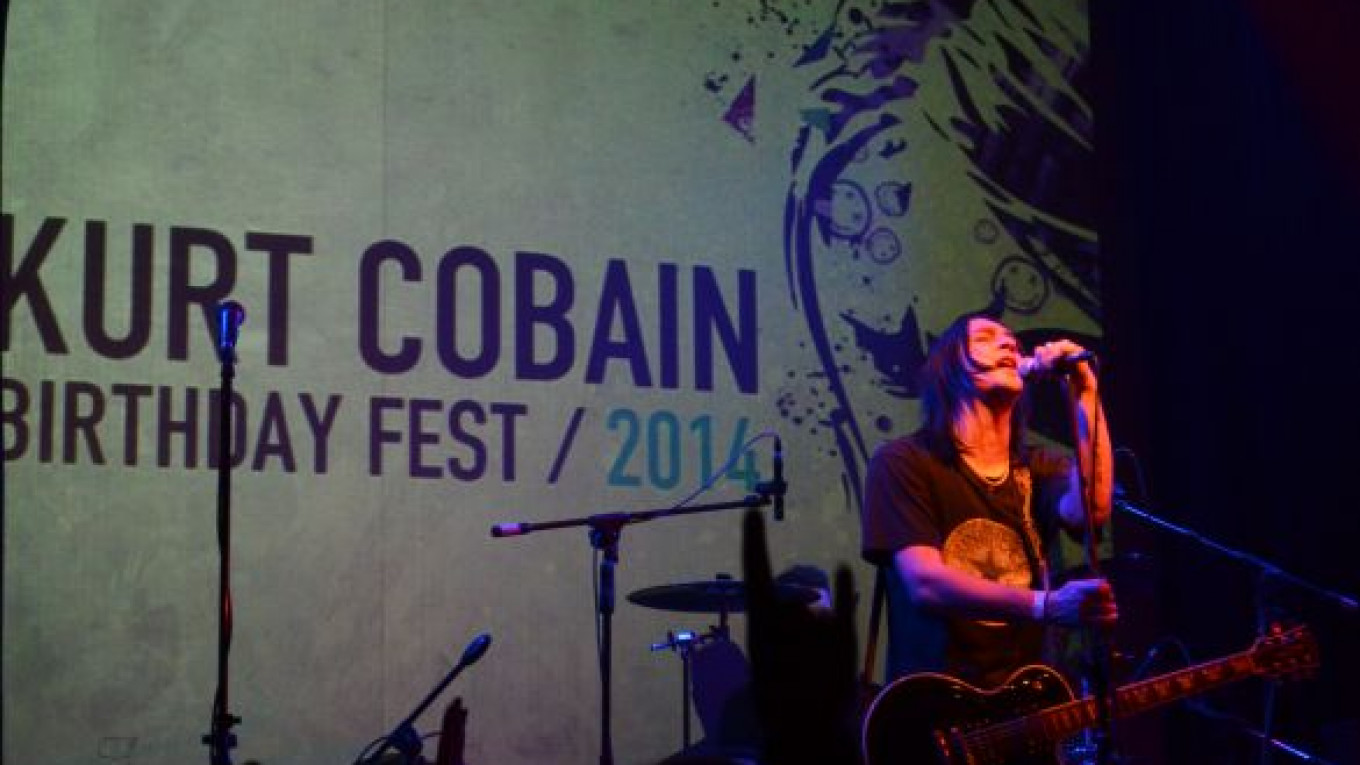The lyrics "here we are now, entertain us," from Nirvana's hit song "Smells Like Teen Spirit" are frequently misheard as "here we are now, imitators," even when sung by now-deceased lead singer Kurt Cobain. However, on Thursday night in Moscow the singers were indeed imitators, as young Russian musicians with thick accents played at the Kurt Cobain Birthday Festival.
Aged Russian grunge fans and younger plaid-wearing wannabes gathered at B2 club near Mayakovskaya metro station for the birthday festival, which has been held almost every year since its inception in 1997.
Vocalist and guitarist Kurt Cobain was best known for founding Nirvana, a Washington-based rock band that helped to bring the style of music known as grunge into the mainstream. Though Cobain died of a self-inflicted gunshot wound in 1994, a dedicated cult of fans helped to spread his music around the world, including to Russia.
"We gathered the best groups in Russia playing grunge, and gradually our audience increased," festival organizer Alexander Kuzmichev said. Kuzmichev added that individual clubs and bands had previously held separate events dedicated to Nirvana and Cobain, and the festival organizers had been inspired to centralize these events in one unified platform.
The festival now takes place in two cities, with events held in Moscow and St. Petersburg, and has a group of regular bands that have played the festival many years running. Four bands played this year's festival, mixing covers of Nirvana songs with some original music, also clearly inspired by U.S. grunge music.
Moscow-based Grunge band Stoner Heart played a set at Thursday's Kurt Cobain Birthday Festival, a yearly event dedicated to the deceased lead singer and guitarist of the band Nirvana.Artyom, a musician from the band "Implozia," which has played at the festival several times in the past, said he had first heard Nirvana's music around 1996, several years after Cobain's death and the band's breakup. The music "was honest," Artyom said, and had created a revolution around the world, though he admitted that he, and most Russian listeners had not understood the lyrics to the songs at first. "People just feel the energy," he said.
Other musicians expressed similar sentiments, and the youth of the crowd seemed to suggest that most people present had either not been born or had been much to young to listen to Nirvana when the band was actually active. This is by no means unexpected — while popular, during their period of activity the band's following was largely limited to serious punk and grunge fans, and their music only became mainstream in the '90s, following Cobain's death.
Nirvana's music "has a certain emotional and social content," a musician from the band "The Glue" said, adding that Russian musicians adapt the style of music to play about more Russia-specific themes in their own music. Nonetheless, the imitational aspects of Russian grunge were hard to deny, with band members even wearing outfits modeled after grunge and punk styles of the early '90s.
As the whole concept of the "grunge" look in the U.S. was largely based on not paying much attention to how one dressed, it seems somewhat ironic that Russian grungers clearly spend considerable amounts of time finding appropriately wrinkled plaid shirts and distressed jeans, likely spending more money on their pre-aged clothing than regular Muscovites do on new clothing.
Apart from the musicians, the audience was startlingly young, with many university students and some people who appeared to be even younger — clearly, Cobain does have a following in Moscow, and his popularity is, if anything, on the rise. The line that formed outside the club before opening stretched halfway down the block and attracted attention from passersby, one of whom remarked "Kurt Cobain? I thought he was dead!"
But for young Russian grunge fans, Kurt Cobain and his music are alive and well.
Contact the author at g.golubock@imedia.ru
A Message from The Moscow Times:
Dear readers,
We are facing unprecedented challenges. Russia's Prosecutor General's Office has designated The Moscow Times as an "undesirable" organization, criminalizing our work and putting our staff at risk of prosecution. This follows our earlier unjust labeling as a "foreign agent."
These actions are direct attempts to silence independent journalism in Russia. The authorities claim our work "discredits the decisions of the Russian leadership." We see things differently: we strive to provide accurate, unbiased reporting on Russia.
We, the journalists of The Moscow Times, refuse to be silenced. But to continue our work, we need your help.
Your support, no matter how small, makes a world of difference. If you can, please support us monthly starting from just $2. It's quick to set up, and every contribution makes a significant impact.
By supporting The Moscow Times, you're defending open, independent journalism in the face of repression. Thank you for standing with us.
Remind me later.






